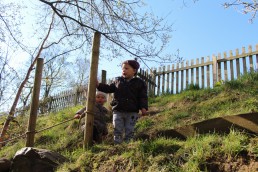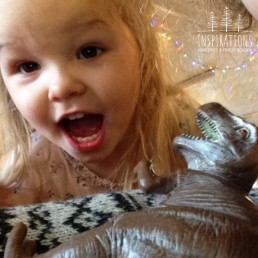Toddler's Forest School Garden
Measured Risks and The Great Outdoors
Getting outdoors could not be more important right now, and the health benefits that come with it are not only beneficial but fundamental to our wellbeing. But are the youngest members of our society getting enough outdoor adventurous play? Recent studies suggest not. 85% of parents admit they would like their children to have more adventure, whilst 44% admit they played outside more as a child then their own children do. Indeed this is a sign of the times and sometimes children miss out on these opportunities due to safety worries.

At Inspirations you can rest assured that your children are getting more than their fair share of outdoor play. Our outdoor areas are of equal, if not more importance to our indoor spaces. The 2-3 age group is where our children are first introduced to a designated forest school area in addition to their outdoor area.
Our toddler room garden is an extension of their classroom, filled with repurposed objects and areas that support the many types of schemas as mentioned in the previous blog. There are balancing beams, planks, crates, small world areas to support interests, and many more. It is here we make use of the larger loose parts and ambiguous resources such as milk crates, planks and go kart wheels. We have an open doors policy so in all weathers our toddlers have access to the outdoors.
Raising Confident Learners
Not all children have easy access to nature, so it's important we offer this space from a young age. But why is it important for young children to experience adventurous play?
In 2019 we gained planning permission to extend our toddler room garden and build a Forest School Area. This zone is opened up with increased staffing and introduces the children to more adventurous play, with tracks, steps, netting, hills and trees to explore and climb.
Providing this access opens up valuable experiences they may not get elsewhere. As their brains are forming, growing and changing every minute these measured risks they are exposed to supports healthy boundaries and emotional and physical development. This purpose built area means children are using core muscles, with hills to mount and areas to climb. The uneven ground tests and strengthens their vestibular balance skills and coordination.
Whilst children navigate this recently developed area we encourage them to safely create their own boundaries, trial ways of movement, and learn to just keep trying. Instead of suggesting how to use the area, we as educators will avoid giving direction but instead ask open ended questions. 'I wonder where you'll go next?' or 'wow that looked really hard, and you didn't give up'. By focusing on questions and observations rather than just praise and direction we are building our toddlers inner confidence that sets them up for life.
By creating dens between the trees, growing lavender and scaling balance beams, having this little taste of adventure prepares our toddlers for Forest School when they move to Pre-school ....and beyond.






Being Two
This Month we are focusing on our middle room at nursery, the toddler room, also known as our Honeybees room. Being two is more commonly referred to as the ‘Dreaded Twos’ or ‘Terrible Twos’; a term we find very unjust and instead celebrate this age with the phrase ‘Terrific Twos'.
Terrific Twos
It is very easy to conclude that your Toddler is in the midst of the ‘Terrible two’s’ when they act up and try push your buttons, especially when you are faced with patience testing tantrums.
It is important to remember that they are experiencing so many emotions and ultimately navigating their way into becoming tiny humans. They do not mean to drive you to the bottle of wine sat in your fridge, they are just growing and learning whilst showing you who they are and that being two really is terrific.
Adventure and Independence
In our eyes being a two year-old is about adventure and independence, traits we
feel are continuing to shape them after the transition from Baby to Toddler.

The Toddler room, or the Honeybee’s room as we refer to it is set up to allow the above,
and is a large area both indoors and out to move around freely, with many areas of
provision to explore and investigate. Whilst these areas are being slowly destroyed by tiny
hands and feet, friendships are being formed, and language is continuing to develop by
using simple sentences to share feelings, experiences and thoughts. They become more
aware of others feelings, and they are starting to understand boundaries and routines, as
well as listening with interest and understanding simple questions.
Milestones - Potty Training
Being Two also comes with it's challenges and a certain milestone is often met during this
period of their lives… Potty Training! Early signs that they may be transitioning
to this stage include awareness and communication. From telling you that they have done
something in their nappy to expressing the urge to go, these are all clear indictors that the
time is right and you should go with it and know that we are always their to support you. Remember that children develop at their own pace and they may not be ready to be potty trained until later.

Here are some links to books and tips for support-
https://www.amazon.co.uk/s?k=potty+training+books+for+toddlers&crid=BLJ3UFJL3K9O&sprefix=potty+training+%2Caps%2C192&ref=nb_sb_ss_ts-doa-p_3_15


Children are not things to be moulded, but people to be unfolded- Jess Lair
Next week we will focus on the importance of schemas, with some tips to supporting young children's language development. In the meantime if you've had a tough day, you've passed bath time and skipped straight to bedtime, you're still doing a great job. Remember it is this age that children are making new connections in their brain, pushing boundaries and learning vocabulary at rapid speed. We have to give credit to them for all this multitasking, whilst keeping our silliness alive, reigniting our imagination, and providing daily entertainment.
Although there can be some hard times amongst the great times if we start to see the world through their perspective we might all agree that life as a toddler can be challenging but also very fun.
-Ashleigh






